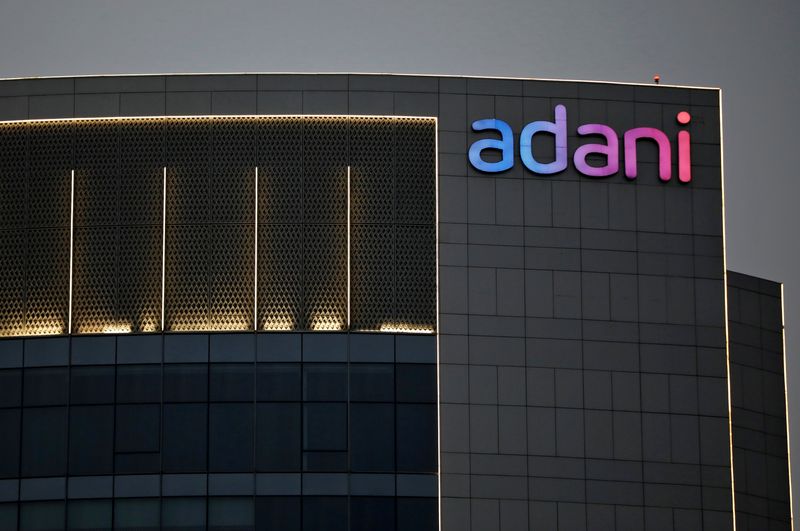By Chris Thomas and Aditya Kalra
BENGALURU (Reuters) - Hindenburg Research said it held short positions in India's Adani Group, accusing the conglomerate of improper use of offshore tax havens and flagging concerns about high debt that eroded $11 billion in investor wealth on Wednesday.
The group, which is led by Gautam Adani, the world's third richest person according to Forbes, dismissed the U.S. short-seller's claims as baseless, saying it was timed to damage its reputation ahead of a large share offering.
The group's flagship firm, Adani Enterprises, will on Jan. 27 launch the country's biggest public secondary share offering, aiming to raise $2.5 billion to fund capital expenditure and pay off some debt.
Hindenburg, known for having shorted electric truck maker Nikola Corp and Twitter, said it holds short positions in Adani companies through U.S.-traded bonds and non-Indian-traded derivative instruments.
Its scathing research report questioned how the Adani Group has used offshore entities in offshore tax havens like Mauritius and the Caribbean Islands, adding that certain offshore funds and shell companies tied to the Adani Group "surreptitiously" own stock in Adani listed firms.
It also said key listed Adani companies had "substantial debt" which has put the entire group on a "precarious financial footing" and asserted that shares in seven Adani listed companies have an 85% downside on a fundamental basis due to what it called "sky-high valuations".
Adani Group's Chief Financial Officer, Jugeshinder Singh, said in a statement the company was shocked by the report, calling it a "malicious combination of selective misinformation and stale, baseless and discredited allegations."
"The Group has always been in compliance with all laws," the company said, without addressing specific allegations made by Hindenburg.
"The timing of the report’s publication clearly betrays a brazen, mala fide intention to undermine the Adani Group’s reputation with the principal objective of damaging the upcoming follow-on Public Offering from Adani Enterprises," it added.
Shares in Adani Transmission fell 9%, Adani Ports And Special Economic Zone slipped 6.3% and Adani Enterprises ended down 1.5%. Collectively, the seven listed group companies lost $10.73 billion in market capitalisation.
On bond markets, U.S. dollar-denominated bonds issued by Adani Green Energy dropped nearly 15 cents to just under 80 cents on the dollar, Tradeweb data showed, while international bonds issued by Adani Ports And Special Economic Zone, Adani Transmission and Adani Electricity Mumbai saw similar declines.
The report coincided with bidding for Adani's secondary share sale by anchor investors on Wednesday, with the company noting in a stock exchange filing participation from Maybank Securities and Abu Dhabi Investment Authority among others.
The research report, Hindenburg said, was based on an investigation over two years that involved speaking with dozens of individuals, including former Adani Group executives as well as a review of documents.
India's capital markets regulator, the Securities and Exchange Board of India, did not immediately respond to a request for comment.
Adani has repeatedly dismissed debt concerns. Singh told media on Jan. 21 "Nobody has raised debt concerns to us. No single investor has."
Graphic 2: Adani stocks tumble on report flagging financial risk, https://www.reuters.com/graphics/ADANI-FINAL/FINAL-ADANI/zgpobrxgovd/chart.png
Graphic 3: Group stocks: Market Cap and price movement, https://www.reuters.com/graphics/ADANI-MCAP/MCAP-ADANI/lgvdklzzkpo/chart.png
Hindenburg's report said five of seven key listed Adani companies have reported current ratios - a measure of liquid assets minus near-term liabilities - below 1. This, the short-seller said, suggested "a heightened short-term liquidity risk".
Adani Group's total gross debt in the financial year ended March 31, 2022, rose 40% to 2.2 trillion rupees.
Refinitiv data shows debt at Adani Group's seven key listed Adani companies exceeds equity, with debt at Adani Green Energy Ltd exceeding equity by more than 2,000%.
CreditSights, part of the Fitch Group, described the group last September as "overleveraged". While the report later corrected some calculation errors, CreditSights said it continued to be concerned about Adani Group's leverage.
Hindenburg also said it was concerned that a high proportion of equity held by promoters or key shareholders in Adani Group listed companies has been pledged for loans.
"Equity share pledges are an inherently unstable source of lending collateral," it said in the report. Founded by Nathan Anderson in 2017, Hindenburg looks for "man-made disasters" in companies, such as accounting irregularities and mismanagement.

Last year, the Adani Group bought cement firms ACC and Ambuja Cements from Switzerland's Holcim (SIX:HOLN) for $10.5 billion. Days later, it pledged shares in the two firms, worth about $12.5 billion at the time, to banks in a non-disposal agreement that prevents it from offloading the shares until lenders agree that debts are paid.
ACC and Ambuja shares each fell more than 7% on Wednesday.